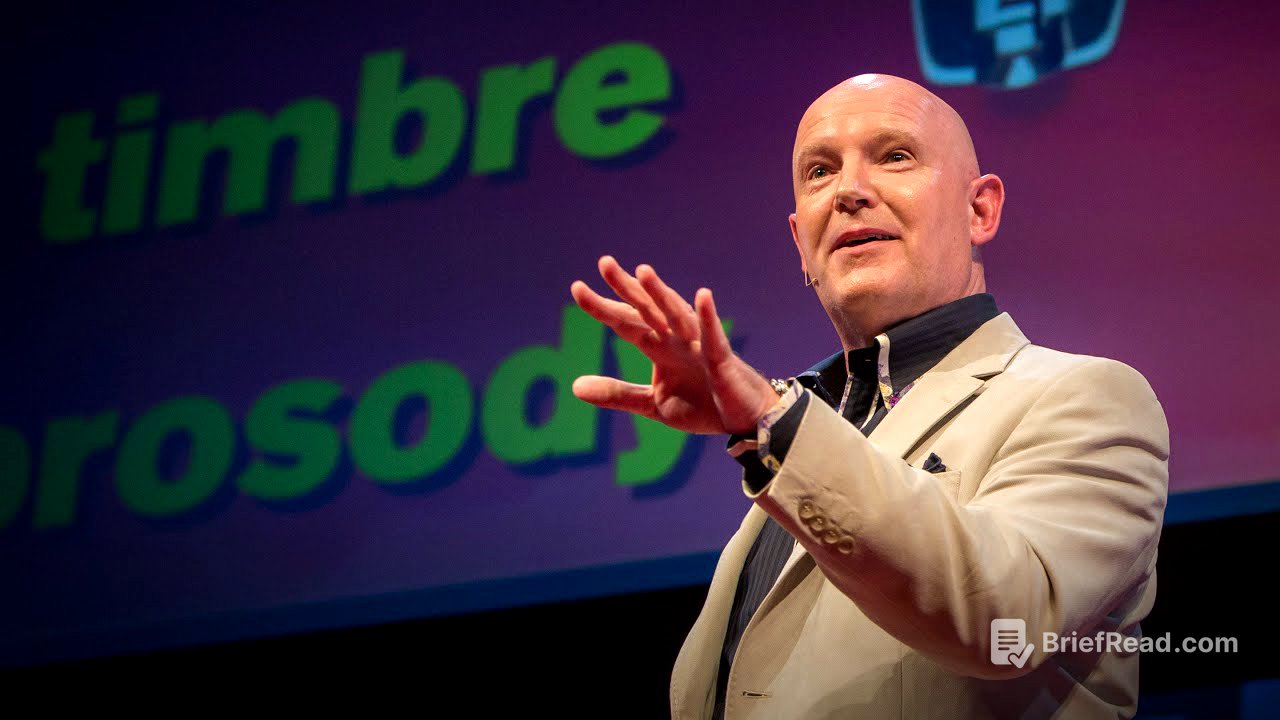TLDR;
This TED Talk explores the power of the human voice and how to use it effectively to create change. It identifies seven common speaking habits to avoid, termed the "seven deadly sins of speaking," and offers four cornerstones, represented by the acronym "HAIL" (Honesty, Authenticity, Integrity, and Love), to guide powerful and impactful speech. The talk also provides practical vocal exercises to warm up the voice and enhance speaking abilities. Ultimately, it envisions a world where conscious sound creation and consumption lead to greater understanding and improved communication.
- Avoid the seven deadly sins of speaking: gossip, judging, negativity, complaining, excuses, exaggeration, and dogmatism.
- Embrace the four cornerstones of powerful speaking: Honesty, Authenticity, Integrity, and Love (HAIL).
- Utilise vocal toolbox: register, timbre, prosody, pace, pitch and volume.
- Warm up your voice with simple exercises before important conversations or presentations.
The Seven Deadly Sins of Speaking [0:49]
The speaker identifies seven common habits that undermine effective communication, referring to them as the "seven deadly sins of speaking." These include: gossip, which erodes trust as the gossiper is likely to speak about you behind your back; judging, which makes it difficult for others to listen openly; negativity, which can be draining and off-putting; complaining, a widespread habit that spreads misery; making excuses, which involves avoiding responsibility; exaggeration, which diminishes the impact of language and can lead to lying; and dogmatism, which presents opinions as facts, hindering genuine understanding.
The Four Cornerstones of Powerful Speaking: HAIL [2:50]
To counteract these negative habits, the speaker introduces four positive cornerstones for powerful speaking, summarised by the acronym "HAIL." Honesty involves being truthful, clear, and direct in your communication. Authenticity means being yourself and speaking from your own truth. Integrity entails being reliable and trustworthy, doing what you say you will do. Love, in this context, means wishing others well, which tempers honesty and makes it difficult to judge them, fostering a more positive and receptive environment for communication.
The Vocal Toolbox [4:22]
The speaker highlights the importance of how you say something, introducing the concept of a "vocal toolbox." This toolbox includes elements such as register, which involves using different parts of your vocal range (e.g., chest voice for authority); timbre, the warmth and smoothness of your voice, which can be improved with training; prosody, the sing-song or meta-language that conveys meaning; pace, varying your speed to emphasise points; silence, using pauses for impact; pitch, adjusting your tone to convey different meanings; and volume, modulating your loudness to capture attention.
Warming Up Your Voice [7:45]
The speaker stresses the importance of warming up your voice before any important conversation or presentation. He leads the audience through six vocal warm-up exercises: deep breaths with a sigh, lip exercises ("Ba, Ba, Ba, Ba" and "brrrrrrrrrr"), tongue exercises ("la, la, la, la, la"), rolling an "R," and the "siren" exercise (weeeaawww). These exercises help to relax and prepare the vocal cords, improving vocal delivery and overall speaking effectiveness.
Creating a World of Conscious Sound [9:04]
The speaker concludes by painting a vision of a world where people speak more effectively, listen more consciously, and design environments that are conducive to good sound. He suggests that by creating and consuming sound consciously, and by designing environments with sound in mind, we can foster greater understanding and improve communication on a global scale.






![AI in HR: What You Need to Know [2025]](https://wm-img.halpindev.com/p-briefread_c-10_b-10/urlb/aHR0cDovL2ltZy55b3V0dWJlLmNvbS92aS96c0hYSzFZNTd5RS9ocWRlZmF1bHQuanBn.jpg)


